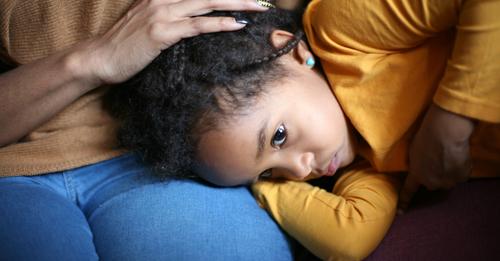Whether you have a newborn, toddler, or teen, seeing your child in distress is incredibly tough. As they grow and develop, they demonstrate many new (and big) emotions, like frustration, guilt, anger, embarrassment, and fear. These strong feelings can quickly overwhelm our kids, particularly younger children who haven’t yet learned effective coping tools to manage their emotions.1 So, how can parents help when their child is in distress?
Our little people often need our support to calm down because they are still learning the required skills to manage big feelings and don’t have the words to share what they need or how they feel. This can result in increased frustration. They are also constantly learning and managing brand-new environments, which can lead to them becoming easily overwhelmed and overstimulated.
How to Spot When Your Child Becomes Overwhelmed
Sometimes it will be easy to spot your child’s distress because they may become louder, insistent, or have rushed or tumbling words. They may also become more physical and need touch, be rough, or exert excess energy by moving their bodies. Other times it will be more subtle and can look like:
- Withdrawing and becoming quiet
- Having emotions that don’t match the situation, like when something exciting is happening and they are scared or sad
- Clinging
- Finding it hard to settle or pay attention
- Postural body changes or other non-verbal cues, like looking away, tensing up, turning, crossing arms, or ducking
How Can Parents Support a Distressed Child?
Here are eight ways you can help provide support to a child in distress:2,3,4
Acknowledge Their Feelings Out Loud
This will help them make sense of their internal experience and feel less scared, confused, or frustrated when they understand what’s going on. But also, when we empathize, we demonstrate that we are attuned and connected to them. Feeling connected makes them feel safe and secure, which is immediately soothing.
Take Time to Listen to Them
Their worries or issues might sound like little things to us, but as they grow, so will the complexity of their problems. If they grow up knowing that we want to listen and care about their experience, they will continue to share when they are older and the stakes are higher.
Don’t Rush Their Feelings
We must allow our children to build their confidence to cope with emotions, which we can do when we don’t rush to fix things too quickly. We can offer to support and ask them what they need or guide them toward coping but don’t swoop in and save the day.
Practice Calming and Self-Soothing Techniques with Them
Co-regulate when you see your child in distress by offering calming techniques, such as cuddles, back rubs, and staying close by for comfort or possibly directing them to relax, drop their shoulders, or unclench their hands (if you notice physical manifestations of distress). Demonstrate how to do deep, calm breathing and sing gentle songs or nursery rhymes together.
Have Firm and Clear Boundaries
Kids don’t like rules, but they need them. When we are clear and consistent with our boundaries, kids know where they stand and what they can expect. This, in turn, helps them feel safe, and kids who feel safe are usually calmer.
Manage Your Distress or Discomfort
When you are worked up or overwhelmed, you aren’t likely to offer your best version of yourself. So, make sure you take a moment to breathe, sip some water, count to 10 – whatever it takes for you to feel more at ease so you can step in and support your little person.
Let Them Know You Support Them
You don’t need to fix all the situations, but being present and having your child know that you care is often all it takes. Say things like “I’m here for you” or “I’m close by in case you need me” when you see your child in distress. Physically staying close by helps demonstrate connectedness and lets them know that there is hope; and that things aren’t okay “yet,” but they will be.
Show Them How You Cope
Let your child see you manage big feelings or narrate your experience while you employ your coping strategies. This will help them see that those big feelings are normal and that there are ways to manage their emotions.
Your relationship with your child is the most powerful tool you can have in your toolbox to get them through their distress. Ensure you look after yourself because supporting an overwhelmed little person can be challenging. If you need help, you could rally your support network. Or, if your child needs more help managing their emotions, you can start by reaching out to your trusted family health professional, like a family doctor, counselor, or psychologist. Just remember that you don’t need to do this alone.
Childhood: 5 yrs+
Toddlers: 2 yrs – 5 yrs
View Sources +–
